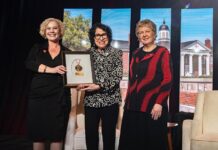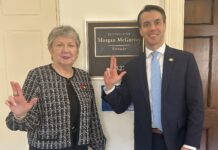LOUISVILLE, Ky. – What does the world’s first 100 percent effective cancer vaccine have to do with manatee rehabilitation?
“You would be surprised,” says UofL vaccine researcher A. Bennett Jenson.
Along with colleague Shin-je Ghim, Jenson is helping U.S. Fish and Wildlife officials make sure that rehabilitated manatees that are released into the wild don’t infect other manatees with a papillomavirus—a cousin of the virus that causes cancer of the cervix, head and neck in humans.
Ghim and Jenson were recently recognized for their work with the Manatee Conservation Award from the U.S. Fish and Wildlife Service.
Manatees are large, slow-moving sea mammals and their populations are endangered due to collisions with watercraft, loss of reliable warm water habitats and destruction of their food supply due to coastal development and pollution. Many sick and injured manatees are rescued every year. These animals are often rehabilitated and returned to the wild with the help of conservation facilities.
The emergence of a virus among captive manatees generated concern from scientists who feared it could compromise the future of the already endangered species. Working with wildlife biologists, Jenson and Ghim isolated the virus and developed a reliable test. They found that the virus wasn’t new ’ although these were the first skin lesions noted by wildlife biologists.
“It is actually a very primitive virus, but it seems to have been latent until recently,” said Jenson.
Scientists speculate that the lesions are a reaction to stress from temperature changes, to which manatees are extremely sensitive.
The problem for wildlife researchers was to determine which manatees were infected with the virus and, if those animals were released into the wild, whether they would infect others in the population. To help find answers, Jenson and Ghim were called on to develop a reliable test for the manatee virus and are in the process of developing a vaccine.
Thanks to recent regulatory changes based on their research, wildlife specialists can release captive manatees without fear of damage to the wild manatee population and they don’t have to quarantine the large mammals in special facilities.
“The U.S. Fish and Wildlife Service would like to acknowledge Drs. Jenson and Ghim for all of their years of work dedicated to understanding manatee papillomavirus and how it impacts this endangered species,” said Nicole Adimey, a biologist with the agency who has been working with the researchers for more than a decade.


























